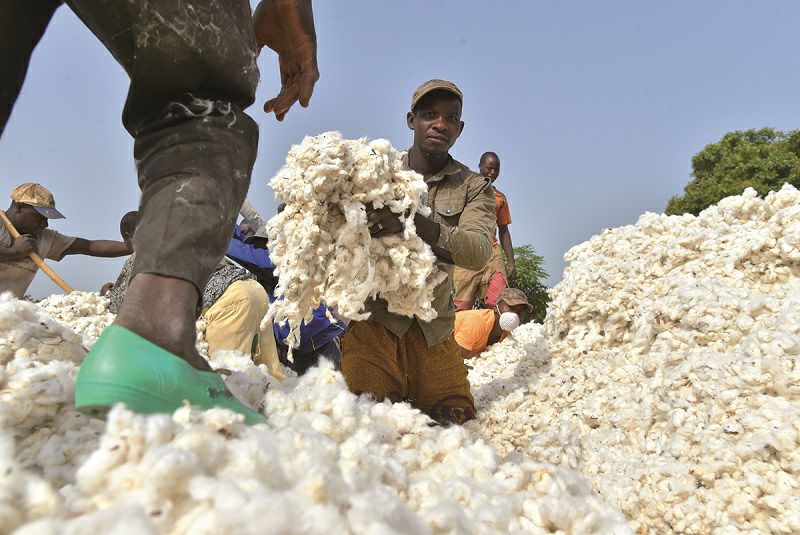Growing Nigeria’s non-oil export is critical to the much-sought economic growth, employment and poverty reduction. Not least, in light of the reality of hydrocarbon resources losing its reliability and honoured position as a revenue source.
Over the years, this realisation has spawned a myriad of non-export campaigns, commentaries as well as other initiatives aimed at creating export opportunities for developing countries like Nigeria.
- PODCAST: How refusal to use pedestrian bridges costs many Nigerian lives
- Corruption leaks: Pressure mounts on Buhari to probe Bagudu, Obi, others
It is my considered view that the African Growth and Opportunity Act (AGOA), for instance, which was enacted in 2000 with the aim of building trade ties between the U.S and Sub-Saharan Africa was somewhat a litmus test to the preparedness of the country’s transition from the lopsided character of the economy in favour of oil.
Regrettably, we failed to get our acts together in making the most of the rich opportunity. From textile/apparel, minerals and metals to agricultural products, disappointing results were posted. For the most part, oil was responsible for the rise in export under the initiative.
Agribusiness is important not least that agriculture is a major contributor to the nation’s GDP, employer of huge labour and also area of comparative advantage albeit its capacity remains largely latent due to many known factors.
It goes without saying that agricultural commodity export holds phenomenal economic prospect for Nigeria. The agricultural produce forms the preponderance of non-oil export with pundits putting the value of processed and non-processed at 70 per cent. Aside the use of these agricultural products as raw materials, the huge diaspora population still have their palate satiated by favourite local dishes.
The sector recorded a stellar performance in Q2 of 2021. The National Bureau OF Statistics (NBS) data showed N165.27 billion worth of agricultural products were exported higher than Q1of same year. The improvement is bigger when juxtaposed with data from the preceding year.
Reports of the shutting out of Nigeria’s agricultural products are too disconcerting to discount. About 76 per cent of agricultural commodities suffer rejection by the European Union (EU) according to National Agency for Food, Drug Administration and Control (NAFDAC). And, for the most part, the issue is quality and safety related.
Regrettably, the list of banned agricultural products is long. Sometime in 2015, the EU placed a ban on beans over an unacceptable amount of dichlorvos pesticide which cost the country 362.5 million dollars annually. It came not long after melon seed was banned for high aflatoxin levels.
This translates not just to huge loss in revenue but sullied reputation! The appalling state of affairs is an indictment on regulatory quality. It was reported that the EU issued several notifications especially to beans exporters without serious efforts at addressing the problems. More so, the EU is one of the biggest export destinations of Nigeria’s agro- products.
Incorporating global best practices in the drive towards ramping up agricultural production will confer competitiveness to our products. Basically, quality food products begin from the farm through appropriate practices and use of farm inputs such as fertiliser, pesticides and post-harvest handling. In fact, it covers the the entire value chain right to the table.
The EU Maximum Residue Limits (MRLs) on pesticides remain a requirement that the country must deal with. Others include availability of storage centres; reports of moulds forming on some of the products are storage related challenges. Information is key and should be available. The dearth of extension workers has been an albatross round the agricultural sector.
Of course, the quality of products required by every export market is not something shroud in secrecy. The whiff of corruption is strong regarding how offending products slither through quality enforcing institutions. Legislation and stronger institutional reforms will be instrumental to the desired change.
Unless changes are instituted on how agricultural exports are handled and subjected to tight standard and quality test, the country may not escape poor showing in the African Continental Free Trade Area (AfCFTA) which is yet another opportunity.
Namibia is an object lesson on diligence and hard work in incorporating standard and quality in export products. It was reported that in 2019, the country exported 124,000 metric tonnes of beef to markets in the European Union, China, Norway and Britain. Today, it has the honour of being the first African country to export beef to the U.S
With complaints and rejection of Nigeria agricultural products, it is disquieting that the country may just have become a receptacle of all manner of harmful imported food products having gone through a lax and compromised monitoring system. It bears stating that poor quality agricultural products hobble socioeconomic development due to the diminution in trade between partners.
Abachi Ungbo can be reached through abachi007@yahoo.com

 Join Daily Trust WhatsApp Community For Quick Access To News and Happenings Around You.
Join Daily Trust WhatsApp Community For Quick Access To News and Happenings Around You.
